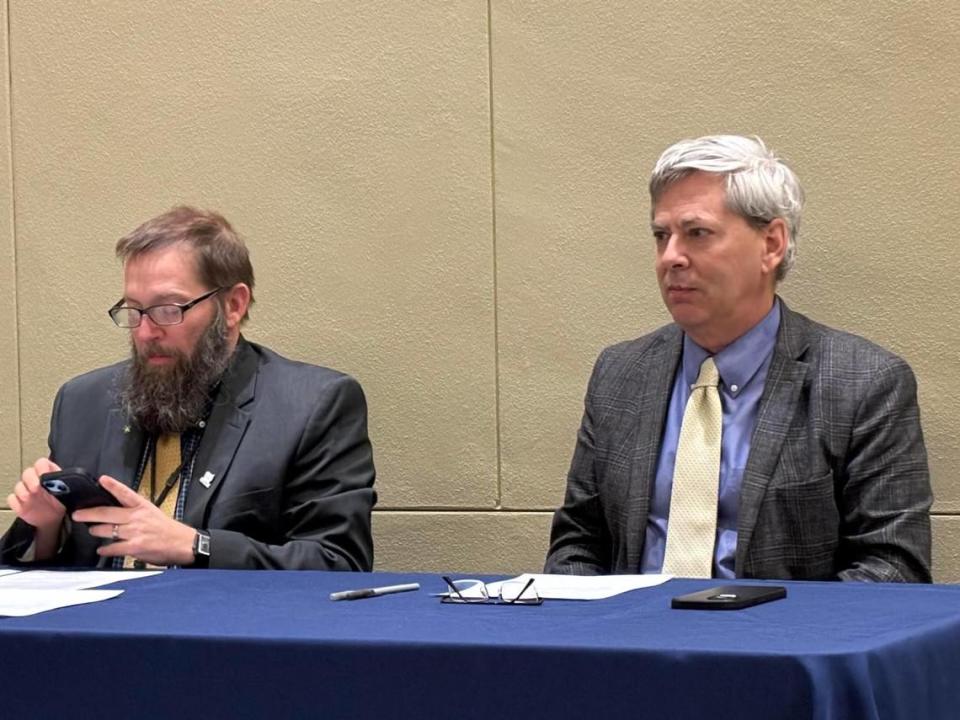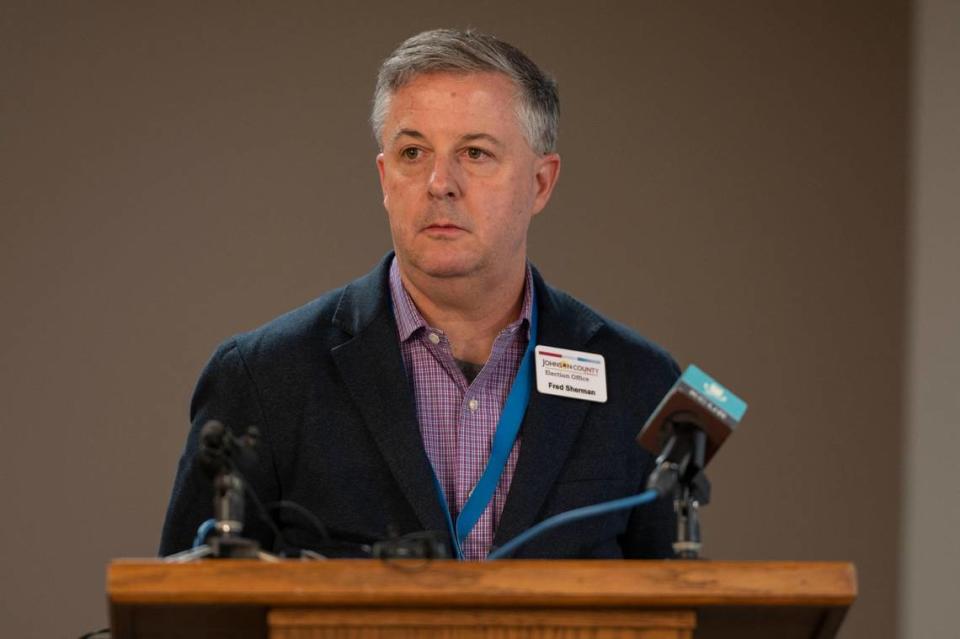Kobach, Schwab opposed on destroying old Kansas ballots during criminal investigation
- Oops!Something went wrong.Please try again later.
- Oops!Something went wrong.Please try again later.
Kansas Attorney General Kris Kobach and Secretary of State Scott Schwab are divided over whether a state law requiring the disposal of old ballots should apply during a criminal investigation, a dispute centered on Johnson County Sheriff Calvin Hayden’s long-running elections probe.
Kobach, who has built a reputation as a staunch opponent of voter fraud, has staked out a position that ballots that may be evidence should be preserved. Schwab, who oversees the state’s elections, maintains that absent a court order, Kansas law provides no authority for election officials to hang on to old ballots after their mandated destruction date.
Last year, Hayden pushed Johnson County Election Commissioner Fred Sherman to continue preserving the county’s old ballots as the sheriff probes an election software company the county once used to manage poll workers.
While acquiescing to past requests, this time Sherman destroyed the old ballots in February in compliance with state law.
Schwab has backed the decision by Sherman, which came after Schwab reminded election officials across the state of their duty to destroy old ballots. In an April 5 letter to Kobach’s office, Deputy Secretary of State Clay Barker, who is also the agency’s general counsel, wrote that absent a judicial directive – such as a warrant or injunction – the mandatory ballot destruction must occur.
The Star obtained the letter through a records request. While Barker made no direct mention of Hayden, the letter appears squarely aimed at the investigation. Judicial intervention, Barker wrote, ensures law enforcement does not use an “interminable investigation for partisan political reasons.”
“The party seeking a stay of destruction should justify to a court the need to prolong the retention of old ballots,” Barker wrote. “Unchecked politicized action, especially if it becomes the subject of repeated public comments, undermines public confidence in both law enforcement and the election process.”

Kobach and Schwab’s diverging positions date back to December when Kobach sent a letter to Sherman urging him to hold on to the ballots, writing that “evidence should be retained until the case is formally closed and all resulting defendants are prosecuted.”
“As you may be aware, the Johnson County Sheriff’s Office is investigating potential crimes relating to the election process in your county. As the state’s chief law enforcement officer, I am concerned that the destruction of these ballots and other election related materials may hinder that investigation,” Kobach wrote to Sherman.
At the request of a state senator, Kobach is now developing a formal legal opinion on the matter. Johnson County officials fear the legal opinion will be used to advance a criminal prosecution of Sherman. Hayden, who is running for reelection, has criticized the county’s election practices, but his investigation hasn’t led to any criminal charges.
An opinion that Sherman should have preserved the ballots could potentially give the sheriff a basis to investigate.
Kansas Secretary of State's Office Letter by The Kansas City Star on Scribd
Most Johnson County officials appear to support Sherman, who was appointed to the job by Schwab.
“Fred Sherman acted in direction from the Kansas Secretary of State’s Office. He didn’t act on his own. And he was in line with state law,” Johnson County Commissioner Becky Fast said this week.

The dispute between the two statewide Republican officials comes as every state legislative seat is on the ballot this fall, with several key battleground districts located in Johnson County.
How to interpret the ballot destruction law isn’t the first election-related dispute between Kobach and Schwab. The two GOP officials have differing views on remote ballot drop boxes, with Schwab supportive of their use as a way to keep ballots out of the mail and Kobach fearing they facilitate “ballot harvesting,” where one person returns numerous ballots from others.
Schwab strongly vouched for the security of Kansas elections. Still, false conspiracy theories surrounding Johnson County’s elections have taken root, fueled in part by Hayden’s investigation, which he has promoted repeatedly in front of conservative audiences.
Hayden’s investigation appears centered on Konnech, an election software company that has called the investigation “baseless.”
Los Angeles County has agreed to pay $5 million to Konnech CEO Eugene Yu, who sued over civil rights violations after he was arrested there in 2022 on accusations that he illegally stored poll worker data in China. The case was dropped a few weeks later, with the district attorney citing “potential bias” in the investigation.
Johnson County had used Konnech’s software to help manage election workers; the program had nothing to do with voting or voting information. The county stopped using the software in 2022.
The Star’s Sarah Ritter contributed reporting
